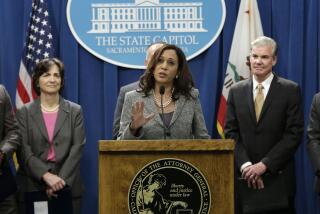Hounded From Office : Now Meese Falls to Left Wing’s Criminalization of Differences
There was a time when the American intelligentsia favored a strong executive branch of government, especially if the President was a Democrat with a brain trust advocating reforms. In those days state and local governments and even Congress were too conservative to find the left wing’s economic, social and political agendas attractive.
In more recent years the situation has been reversed as the electorate has chosen more conservative Presidents less inclined to reform America into an unrecognizable entity.
Meanwhile, Congress is the power base of the politically active left. As a result of gerrymandering, the Democrats seem to have a permanent lock on the House, while Republicans seem to hold the advantage in presidential contests. This situation has encouraged the left wing to tear down the powers of the presidency.
To assault the executive powers of the President, Congress created a weapon called the special prosecutor, more recently known as the independent counsel. The counsel’s function is to prevent the executive branch from governing by dislodging faithful or aggressive presidential appointees from office.
Now anytime the left wing doesn’t like a policy, all it has to do is smear the official identified with it and demand a special prosecutor. Considering the nature of the Washington press corps, it is easy to drum up charges against anybody: For example, Atty. Gen. Edwin Meese III was hounded from office despite being cleared of criminal wrongdoing.
The result is the criminalization of policy differences. Political battles can no longer be settled by voters. The left wing has moved them into the criminal courts.
The effect of this must be to cool the ardor of any presidential appointee. The last thing that he wants is to rile Congress, lobbyists or the media and ruin his chances of becoming a Washington insider.
All this is incentive enough to keep a finger in the wind and avoid becoming a target. Now a presidential appointee has an even stronger reason to take his direction from Congress: to avoid becoming the focus of a criminal investigation.
Indeed, the special-prosecutor legislation makes him a target for anyone who might want his job. The only way in which he can protect himself and hold on to his job is to build the widest possible basis of support. This prevents him from advancing any policy that is unacceptable to the Washington Establishment.
True, the special prosecutor may be unable to find an indictable offense, but a special prosecutor is checked only by his or her own decency. The normal restraints on prosecutory powers are altogether lacking.
A normal prosecutor begins with the fact of a crime or broken law and makes a case against the suspect. A special prosecutor begins with a suspect and fishes around for some law or action that will let him pin a crime on his victim.
Another important difference is that a normal prosecutor has a budget to fit. He or she must make decisions based on the relative seriousness of a large number of crimes, the costs of prosecuting and the justice served. A special prosecutor has an open-ended budget and can continue the investigation indefinitely.
Justice Antonin Scalia observed that the office of special prosecutor constitutes a two-front attack on the ability of a President to pursue his policies even if he has an overwhelming electoral mandate. On the one hand, the office weakens “the presidency by reducing the zeal of his staff.” On the other hand, it “enfeebles him more directly in his constant confrontations with Congress by eroding his public support” through criminal investigations of his appointees.
The criminalization of disagreement has already destroyed the quality of political life in Washington and is making the substantive discussion of issues irrelevant. The political left has a new way to win that is totally independent of policy facts and analysis.
A presidency lacking the determination of a Lenin and the ruthlessness of a Stalin is shredding fodder for the Congress. This leaves the presidency an empty shell whose only utility is as a career ladder for people to enter the Washington Establishment. Forget “national policy debates,” elections, democracy. That stuff is over with. Any appointee who brings naive notions about elections and presidential goals to his executive branch job will be indicted for sure.
The debate over what the New York Times calls “a key structural change in the government” concerned only the constitutionality of the special-prosecutor law. This debate was pointless, because sophisticated Americans long ago realized that Supreme Court decisions relate more to the politics of the day than to the Constitution. There are many destructive and evil things that Congress can do that are constitutional but that must nevertheless be opposed. The presidency acquiesced in its own destruction when it couldn’t muster the courage to veto Congress’ new political weapon.
More to Read
Get the L.A. Times Politics newsletter
Deeply reported insights into legislation, politics and policy from Sacramento, Washington and beyond. In your inbox three times per week.
You may occasionally receive promotional content from the Los Angeles Times.










